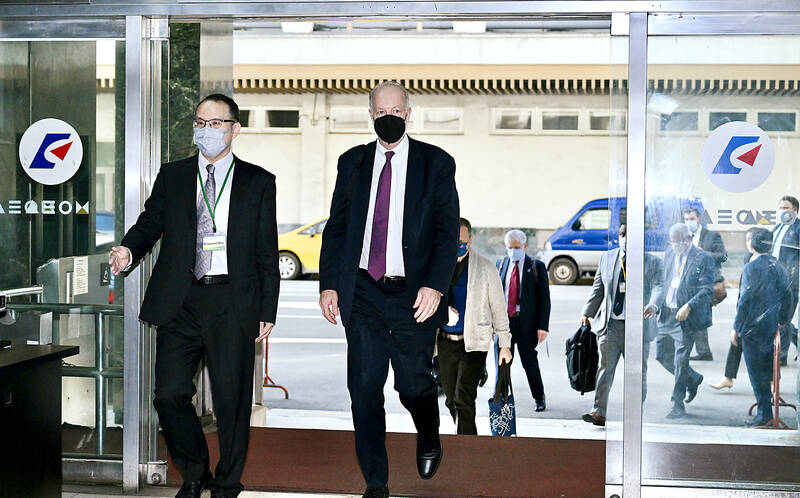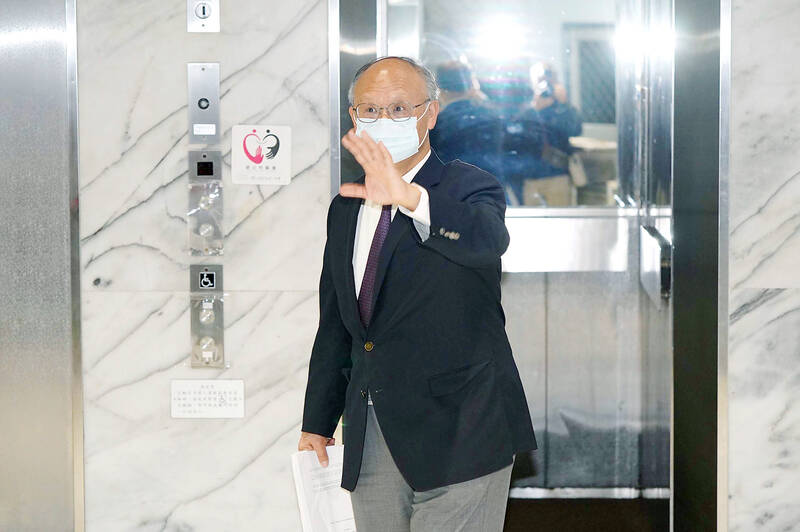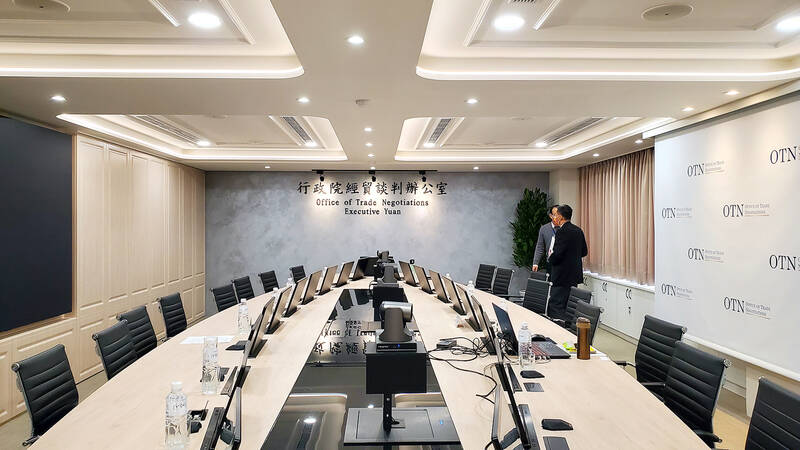Taiwanese and US trade officials began a second round of talks in Taipei on Saturday under a recently launched trade initiative aimed at improving the overall bilateral trade environment.
Leading the two sides in the talks under the US-Taiwan Initiative on 21st-Century Trade are US Assistant Trade Representative Terry McCartin and Office of Trade Negotiations Deputy Trade Representative Yang Jen-ni (楊珍妮).
McCartin arrived in Taipei on Friday with a delegation of more than 20 US officials, and attended a dinner later that day hosted by Minister Without Portfolio John Deng (鄧振中), Taiwan’s top trade negotiator, a Cabinet official familiar with the matter said on condition of anonymity.

Photo: George Tsorng, Taipei Times
The US delegates are not scheduled to meet with President Tsai Ing-wen (蔡英文) or Premier Su Tseng-chang (蘇貞昌) due to “tight schedules,” the official said.
Few details have been revealed about this round of talks, but the Office of Trade Negotiations is expected to brief the public on its outcome after the negotiations conclude on Tuesday, the official said.
Speaking to local media yesterday morning, Deng said the government prepared well for this round of talks, and he is optimistic about progress.

Photo: CNA
He said that among the 11 issues outlined by the initiative, Taiwanese officials would focus on trade facilitation, the promotion of small and medium-sized enterprises, effective regulatory practices and anti-corruption measures.
The goal of the government continues to be that the two sides can “reach some high-standard and economically meaningful agreements” by the end of this year, Deng said.
Under the initiative launched in June last year, bilateral negotiations are also expected on trade issues related to agriculture, state-owned enterprises, nonmarket policies and practices, digital trade, standards, labor and the environment.

Photo courtesy of the Taiwan’s Office of Trade Negotiations
However, the initiative does not cover tariff reductions.
The talks in Taipei follow two days of meetings held in New York in November last year, at which McCartin and Yang also served as the lead officials for the US and Taiwan respectively.

OPTIMISTIC: The DGBAS sharply upgraded its GDP growth estimate from 3.54 percent to 7.71 percent after the Taiwan-US trade agreement signing and given AI optimism The US imported more from Taiwan than China for the first time in decades, as US President Donald Trump’s tariffs reshape trade flows while a global boom in artificial intelligence (AI) fuels demand for tech products. US purchases of goods from China plunged almost 44 percent in December last year from 2024 to US$21.1 billion, US Department of Commerce data showed on Thursday. By contrast, shipments from Taiwan more than doubled during the same period to US$24.7 billion. The soaring Taiwanese shipments to the US reflect the huge expansion in supplies of chips and servers for AI companies, which has completely changed

NON-NEGOTIABLE: The US president’s action ran counter to one of the US’ ‘six assurances’ on not consulting China about arms sales to Taiwan, US lawmakers said US President Donald Trump’s admission that he is discussing arms sales to Taiwan with Chinese President Xi Jinping (習近平) is “alarming and a blatant violation of US policy and the six assurances,” US Representative Ro Khanna said on Tuesday. Trump on Monday said he would decide soon on whether to send more weapons to Taiwan, after Xi warned him not to do so. “I’m talking to him about it. We had a good conversation, and we’ll make a determination pretty soon,” Trump told reporters aboard Air Force One when asked about warnings raised by Beijing during a phone call with Xi over

US and Chinese fighter jets briefly faced off above waters near the Korean Peninsula this week, Yonhap News agency reported, marking a rare confrontation in that area between the two superpowers. About 10 US fighter jets on Wednesday departed an airbase in Pyeongtaek, South Korea, for drills above international waters off South Korea’s western coast, the news outlet cited unidentified military sources as saying. While the US planes did not enter China’s air defense identification zone, Beijing scrambled planes as they neared that region, the report said. “The Chinese People’s Liberation Army organized naval and air forces to monitor and effectively respond

VACILLATING? Some US officials are concerned that Trump’s April visit to Beijing might be affected if Washington pushes through additional weapons sales to Taiwan A major US arms sales package for Taiwan is in limbo following pressure from Chinese President Xi Jinping (習近平) and concerns among some US officials that greenlighting the deal would derail US President Donald Trump’s upcoming visit to Bejing, the Wall Street Journal (WSJ) reported on Wednesday. Trump on Monday said that he would decide soon on whether to send more weapons to Taiwan, after Xi warned him not to do so. “I’m talking to him about it. We had a good conversation, and we’ll make a determination pretty soon,” Trump told reporters aboard Air Force One when asked about warnings raised